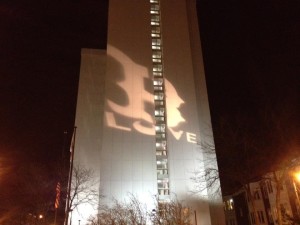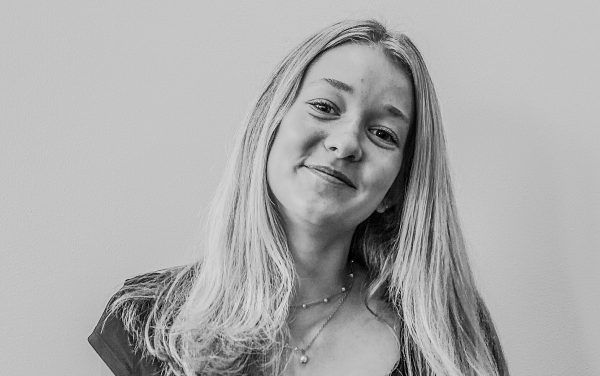[One Year Later] Boston Strong: Former Little Hawk Editor Writes from Boston
April 17, 2014

The following is a letter from former Little Hawk opinion editor Harrison Burke. He currently attends Boston University and has lived through the recent events.
To my former fellow students,
The sirens haven’t really stopped yet. There was a lull on Tuesday and Wednesday, but while walking around you still saw the occasional car fire up its lights and tear off through traffic. As I write this, the City of Boston and its surrounding suburbs are effectively locked down: residents have been asked to stay inside, and ordered to open their doors only for a uniformed officer. Public transit is shut down. Driving is discouraged, and likely to get you stopped in the street. Amtrak won’t send anything past Connecticut. Greyhound, Bolt, and Megabuses are no longer allowed to leave the city. Logan – the airport – is still running, but security is brutal, and planes have been stopped and rechecked both coming in and going out. Downtown is empty: the streets deserted, windows dark and no one in sight.
And I can still hear sirens in the distance.
A series of events last night worked Boston into its current state. A small time robbery at a Cambridge 7/11 resulted in the death of an MIT police officer. The suspects stole a car and drove west – away from Boston. After hijacking another vehicle, they opened fire on the police pursuit with an automatic weapon and explosives – rumored to be grenades. During this, they were identified as the two men the FBI released pictures of only yesterday, wanted for suspected connections to the bombing at the Boston Marathon on Monday. During the early hours of the morning, one was shot and killed; the other remains at large: and is being hunted by what seems to be every law enforcement officer and soldier in the area.
This is all because of the Monday attacks. Marathon Monday in Boston is a state holiday – Patriot’s Day. But really, it’s an excuse for everyone to skip work, drink, and watch the marathon: either from your own home, or out on the side of the 26 mile racetrack. That’s where I was: on the racetrack. I live just off the street, a mile from the finish line. I was outside at three o’clock, trying to find a gap in the runners so I could cross. Just as I did, the policemen at the intersection stepped into the road and yelled at people to get back. To clear the road. Stand aside. Understand: this is the most heavily policed event of the entire year. There is an officer or soldier standing every 15 feet on both sides of the road for the last 5 miles of the race. The road cleared in moments, and the ambulance that had been parked in front of our building pulled a U-turn and torn off toward downtown – the finish line. Another came up the road a minute later. Not understanding what was happening, I walked a couple more blocks to a friend’s apartment, and as I was waiting for them to buzz me in, habitually checked Facebook on my phone.
The top three items were statuses from friends of mine, saying there had been an explosion in Copley square – where the race finished. Then a second explosion. I hoped – I really hoped – that something had just gone wrong. That a car had crashed, or a transformer blew. Anything other than what I knew it was. Growing up in Iowa City, news like this was always somewhere else. I viewed it through the television and computer screen, unfolding in brutally high-definition. That’s not to say that nothing bad ever happened to Iowa City: we’ve had our floods, our tornadoes – our share of disasters. But those were just that: natural disasters. Bad luck. Poor timing.
This was something else. Hate. Pure concentrated hate. A desire to hurt another human being. To hurt Boston. I watched the aftermath on the screen of my phone, while sitting on the floor of my friend’s apartment. Desperately flipping between Twitter, Facebook, and the local news. It unfolding in crappy, lo-res Twit-pics and frantic statuses and it was the most horrific thing I have ever seen in my entire life.
I sat there for three hours trying to understand what was going on. We know more now, but we’re still trying to understand what’s going on.
The next few days in Boston were pretty shaky. Downtown remained closed. A lot of classes were cancelled, businesses dark. The Theatre students – of which I am one – spent a lot of time just being together. We talked a lot with our teachers, and one of mine said something rather true: “It’s times like this – the times when someone is doing their worst – that you see the best in others. It sucks, but it’s true. The best thing you can do now is to keep living your life. If you sit scared, they succeed.” That is, by definition, the goal of terrorism.
But I don’t think that people are frightened, not anymore. There’s an undercurrent of fear, yes. But it’s masked by confidence. And anger. And hope. And pride.
The last few days – and the first few hours – brought out the best in the people of Boston. Monday afternoon, not only had my parents called me, but the parents of both of my best friends. My class – the 27 design students I work with -had all checked in with each within 10 minutes – none of us were harmed, or even close, for which I am extremely thankful. The student head of my department called everyone. Both my advisors emailed me. And the head of the college called each one of us to make sure we were all right. That was the biggest comfort – knowing there were so many people who were looking out for me, and knowing that everyone I cared about was all right.
The next day we read stories of the marathon runners who after finishing the 26 mile race ran another two miles to Massachusetts General to donate blood. Stories about the off duty-officers and vets who didn’t finish the race, but ran directly toward the explosions. Stories about the civilians that followed them. There was the outpouring of support and love from all over the country and world – one of the best, and most touching from the Yankees, who historically have had little love for Boston and the Red Sox. They proudly displayed both teams logos on Yankee stadium, saying “United We Stand.” The Chicago Tribune sports page declared that today they were Chicago Red Sox, Chicago Bruins, and Chicago Patriots. President Obama gave a truly moving eulogy at the joint memorial service for the three fatal victims of the attack. In my mind, his best point was not an original one, but a simple phrase taken from a picture of eight-year-old Martin Richard – one of the victims of Monday’s attack. In the picture, Martin holds a homemade poster reading “No more hurting people. Peace.” Stephen Colbert had a serious but funny intro to his Tuesday night show in which he pointed out the bombers made a poor choice in attacking what the Marathon and what is perhaps one of the most stubborn cities in America: “A group of people so tough they run 26 miles on their day off.” Obama made the same point late Monday when he said, “Boston is a tough and resilient town. So are its people.”
That has been the overriding sentiment here. It’s what the people of Boston are saying in tweets, posts, pictures, banners, articles, and actions. People are donating to everyone affected by Monday, in any way they can. Giving money, food shelter, skills: anything that they have. The Red Cross actually started turning away blood donors, saying that they have too much. The statue in the middle of my campus is knee-deep in flowers and the school has started a memorial scholarship to honor the student that lost her life Monday afternoon. The Red Sox refused to cancel their game, and the singer of the national anthem at the Bruins game was drowned out as the entire arena sang along with him. My own department created a colossal sign on the office building across from our theatre, projecting light onto it that read “B-Love.” MIT, now a victim in its own right, lit their tallest building facing Boston with a 15 story American flag.
And everywhere, people keep saying that this may have been a tragedy, but we are stronger then it. That they may have hurt us, but they cannot break us.
Boston Strong,
Harrison































